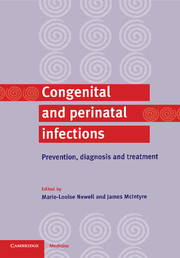Preface
Published online by Cambridge University Press: 06 July 2010
Summary
Healthy pregnant women are not usually more susceptible to infections than non-pregnant women, but when infections occur during pregnancy there is often considerable concern about the possible adverse effects on the fetus or newborn. Perinatal infections remain a major cause of morbidity and mortality in infants in both the developed and developing world, and the range of infections known to be associated with perinatal infections continues to increase. Diagnosis has improved with new diagnostic techniques, including advanced serological techniques and ultrasonography.
Doctors in obstetrics and paediatrics and their midwifery colleagues need to be aware of recent advances in knowledge with regard to these conditions, which can translate to preventive measures and which have implications for decisions regarding antenatal screening packages. Several exhaustive reference books exist; and this book is not intended to replace these. We hope that it will provide a concise up-to-date review of the field which will provide easily accessible information, with an explanation of the underlying mechanisms and approaches to prevention, for medical practitioners of all disciplines. The authors are all experts in their fields, drawn from both developed and developing countries, which we hope will add to the relevance of this book for all settings.
- Type
- Chapter
- Information
- Congenital and Perinatal InfectionsPrevention, Diagnosis and Treatment, pp. xi - xiiPublisher: Cambridge University PressPrint publication year: 2000



